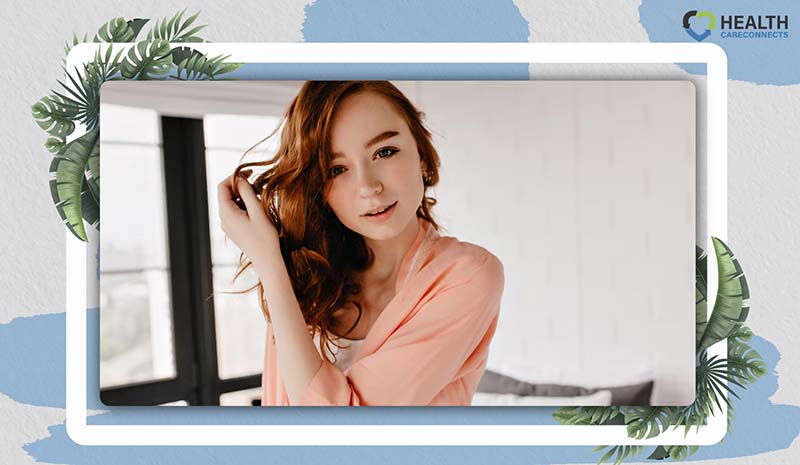Transforming your hair from dull and lifeless to healthy and vibrant is easier than you think. The secret lies in a natural ingredient that’s gaining popularity: flaxseed.
This blog by Health Connect answers the burning question, “Is flaxseed good for hair?” and showcases how incorporating flaxseed into your routine can lead to remarkable hair growth and strength.
Get ready to unlock the full potential of your hair with flaxseed’s nourishing properties.
Is Flaxseed Good For Hair?
Flaxseed has gained recognition for its impressive nutritional profile. This includes essential fatty acids, vitamins, and fibers. These nutrients are not only beneficial for overall health but also contribute significantly to hair health.
The omega-3 fatty acids in flaxseed help nourish the hair follicles, promoting healthy hair growth. The high vitamin E content in flaxseed acts as an antioxidant, protecting the scalp and hair from damage. Additionally, the fibers in flaxseed help ensure that nutrients are effectively absorbed.
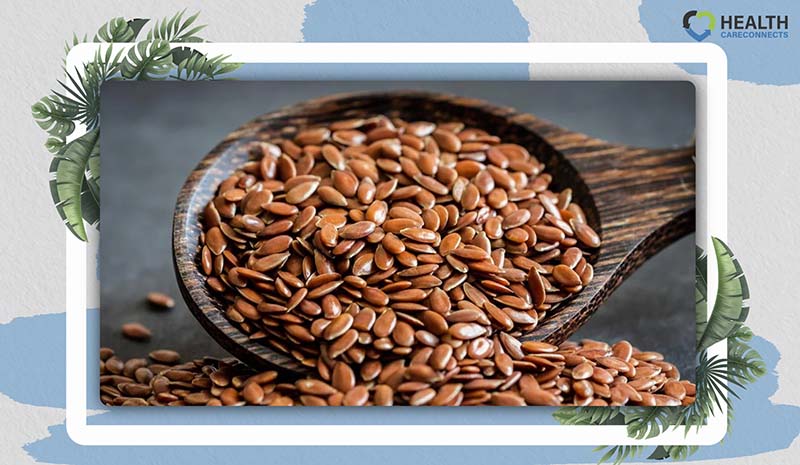
10 Ways Flaxseed Boosts Hair Growth
Is flaxseed good for hair? Yes, there are even 10 benefits of flaxseed for hair that you may not know yet.
Shields Hair Strands
Flaxseed is a rich source of omega-3 fatty acids and vitamin E, which strengthen the hair and prevent breakage. These nutrients work from the tips to the roots, promoting the growth of new hair follicles and ensuring new, stronger hair growth.
Reduces Hair Fall
Hair can start thinning due to various reasons. These include excessive sun exposure, pollution, stress, and unhealthy eating habits.
Flaxseed, being rich in essential fatty acids and vitamins, can help address this issue. Incorporating flaxseed into your hair care routine will strengthen your strands and significantly reduce hair loss.
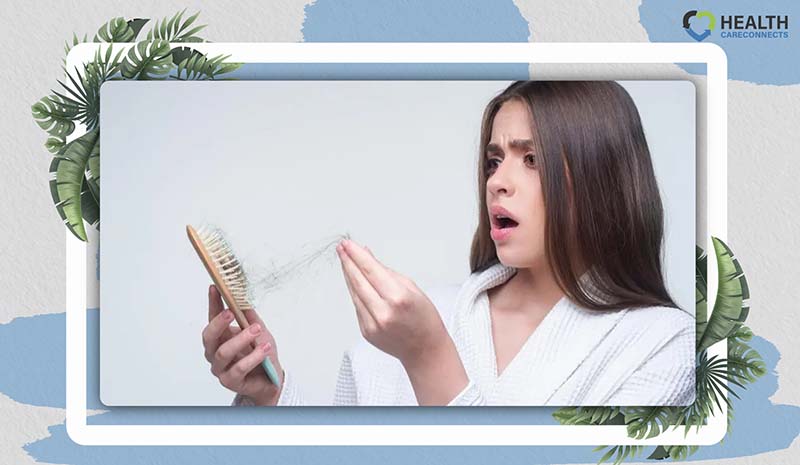
Restores Dry, Damaged Hair
The vitamin E found in flaxseed is crucial for preventing and repairing damaged hair. Flaxseed oil fights free radicals, reduces scalp inflammation, and adds luster to your hair. It also increases its elasticity, making it a versatile solution for restoring dry, damaged hair.
Promotes Hair Growth
Flaxseed provides the scalp with the nutrients it needs to promote healthy hair growth. Regular use ensures a well-moisturized scalp, keeping scalp issues at bay and supporting overall hair health.
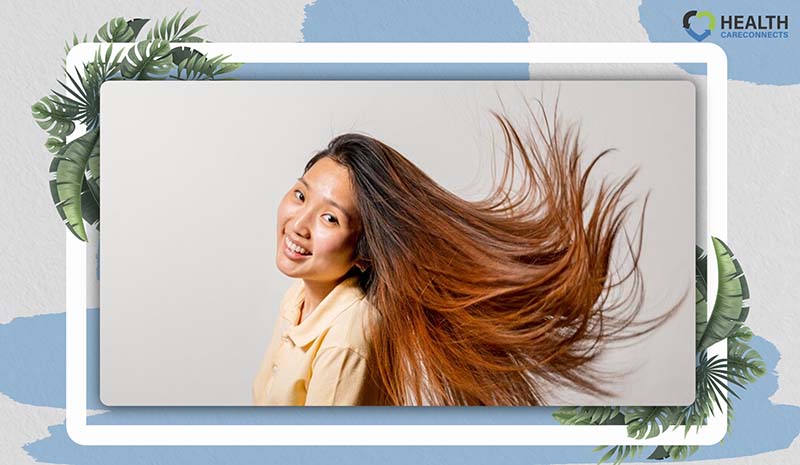
Hydrates Frizzy Hair
Rich in essential nutrients, flaxseed penetrates the hair strands and provides thorough nourishment. Therefore, you should include flaxseed in your conditioners, hair growth oils, and anti-hair fall shampoos. This new hair care will hydrate frizzy hair, making it smoother and more manageable.
Fights Dandruff
Dandruff can cause an itchy, flaky, and dry scalp, potentially leading to more serious scalp conditions. Flaxseed’s omega-3 fatty acids help reduce scalp infections, including dandruff and alopecia.
These fatty acids combat flakiness, significantly reducing dandruff and preventing undesired hair conditions.
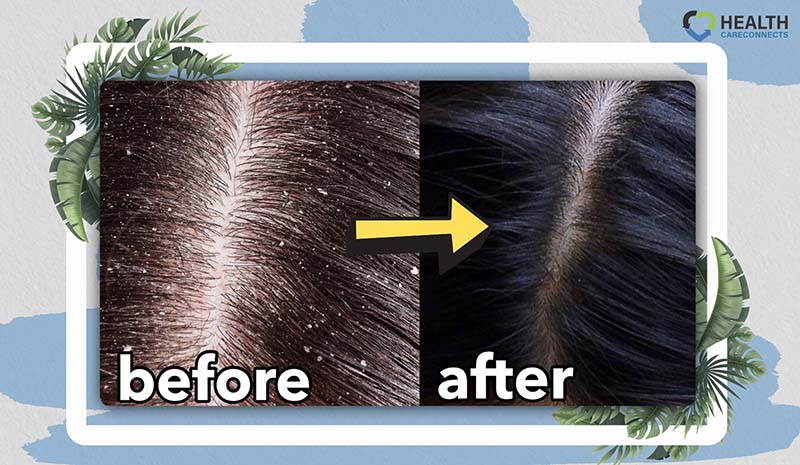
Soothes Scalp Irritation
The omega-3 fatty acids in flaxseed reduce inflammation and scalp sensitivity. Flaxseed helps balance scalp pH and oil production, soothing the sebaceous glands. It also ensures they produce the right amount of sebum for healthy hair growth.
Prevents Split Ends
Dry hair tips increase the risk of split ends, which can make hair dry, brittle, and rough. Exposure to the sun and using hair styling tools can also cause split ends.
Flaxseed, enriched with protein and vitamin E, helps eliminate split ends. This makes flaxseed an effective home remedy for split ends.
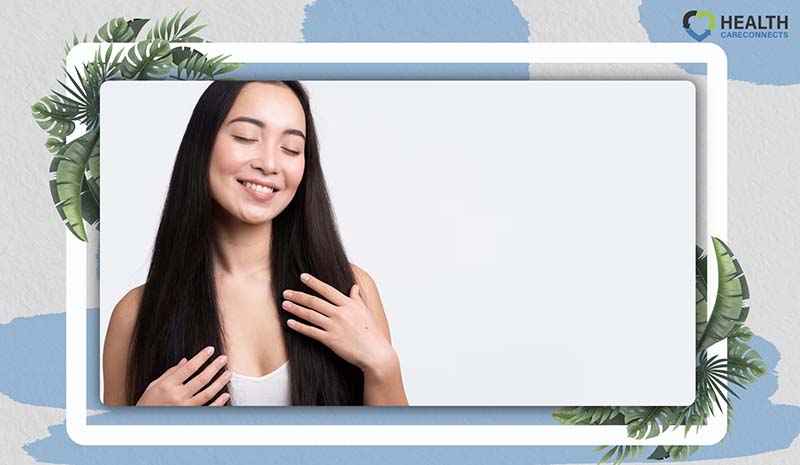
Feeds All Hair Types
Packed with vitamin E and omega-3 fatty acids, flaxseed provides ultimate nourishment to your hair, regardless of your hair type. Using flaxseed oil can result in smooth, healthy hair, making it one of the best haircare tips to follow for all hair types.
Strengthens Hair
Flaxseed has the power to nurture and nourish your hair, protecting it from environmental stressors. Regular use of flaxseed strengthens hair, making it more resilient and healthy.
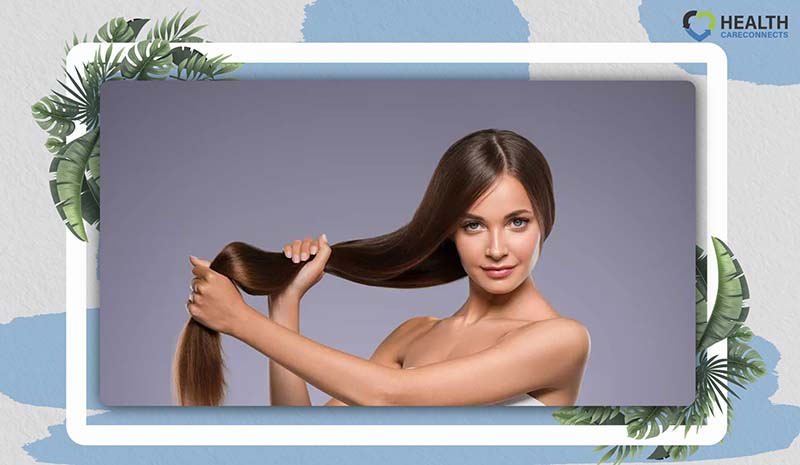
Comparison: Flaxseed Gel Versus Flaxseed Oil
Now that you are familiar with the benefits of flaxseed for hair, you might wonder, “Is Flaxseed Oil good for hair?” or “Is Flaxseed Gel good for hair?” These different ways to use flaxseed can be confusing. Don’t worry, we are here to help you understand.
Flaxseed Gel and Flaxseed Oil share many benefits, but each has unique qualities.
Flaxseed Gel:
- Moisturizing: Being water-based, flaxseed gel provides excellent moisture to the hair.
- Multi-Purpose Styler: Ideal for natural hair, it defines curls, twist outs, loc-retwists, and can be used for sleek ponytails and buns.
- Nutrient-Rich: Adds essential nutrients to the hair while enhancing its style.
- Application: Perfect for those seeking a product that offers both styling and nutritional benefits.
Flaxseed Oil:
- Adds Shine: Known for its ability to add shine to the hair.
- Reduces Frizz: Effective in reducing frizz, making hair smoother and more manageable.
- Nutrient-Rich: Provides the same health benefits as the gel, contributing to overall hair health.
- Non-Moisturizing: Unlike the gel, it does not offer moisture and is not suitable as a standalone styler.
- Application: Best for those looking to enhance hair shine, reduce frizz, and add nutrients.
Notes:
- Combining Use: For optimal results, consider using both products. Apply flaxseed gel for moisture and styling, and finish with a small amount of flaxseed oil for added shine and frizz control.
- Customization: Adjust the ratio of gel to oil based on your hair type and desired outcome.
Ground Or Whole Flaxseeds?
You may come across two types of flaxseeds, ground and whole flaxseeds. This may leave you wondering which type to choose. Here are some comparisons that could help you make your decision.
Ground Flaxseeds:
- Easier to Digest: Most nutrition experts recommend ground flaxseeds as they are easier to digest. This ensures you receive all the nutritional benefits.
- Nutrient Absorption: Grinding flaxseeds breaks down the hard outer shell. This makes it easier for your body to absorb the omega-3 fatty acids, fiber, and other nutrients.
- Versatility: Ground flaxseeds can be easily added to smoothies, baked goods, and various dishes without altering the texture significantly.
Whole Flaxseeds:
- Pass Through Undigested: Whole flaxseeds may pass through your intestine undigested, which means you might not get the full benefits.
- Preference: Some people prefer consuming whole flaxseeds for their crunchy texture and the minor benefits they provide in aiding digestion as they pass through the system.
Choosing the Best Option:
- Personal Preference: The choice between ground and whole flaxseeds often comes down to personal preference. Some individuals might enjoy the texture of whole flaxseeds. Others prefer the convenience and enhanced nutritional absorption of ground flaxseeds.
- Combination Use: You can use both forms in your diet. Use ground flaxseeds in recipes where you want to maximize nutrient absorption and whole flaxseeds in dishes where you want added texture.
Notes:
- Storage: Store ground flaxseeds in an airtight container in the refrigerator to prevent them from going rancid.
- Grinding Whole Flaxseeds: If you prefer to grind your flaxseeds at home, you can use a coffee grinder or blender to ensure freshness.
Utilizing Flaxseed For Enhancing Hair Growth
The benefits of flaxseed for hair can be obtained in various ways to promote hair growth. Here are some effective methods:
Flaxseed Oil
- Preparation: Take two tablespoons of flaxseed oil and warm it slightly to provide a soothing effect.
- Application: Gently pour a few drops on your scalp and massage in circular motions to enhance hydration. Massage from the roots to the tips of your hair.
- Heat Treatment: Wrap your hair with a hot towel to preserve the nourishment and hydration from the oil.
- Duration: Leave the oil on your hair for about 30 minutes.
- Washing: Wash it off with a mild sulfate-free shampoo to protect your hair.
- Frequency: Repeat this process two to three times a week to see noticeable benefits.
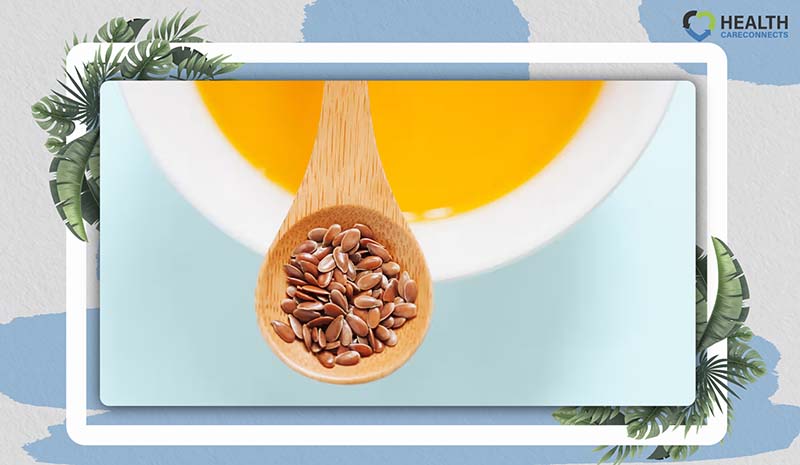
Flaxseed Hair Mask
- Ingredients: Take one tablespoon of ground flaxseed, two tablespoons of yogurt, and half a tablespoon of honey.
- Preparation: Mix these ingredients well to form a smooth paste.
- Application: Apply the mixture to your hair, ensuring even coverage.
- Duration: Leave it on for 30 minutes.
- Washing: Wash off with a mild shampoo and conditioner.
- Frequency: Use this mask once or twice a week for the best results.
Variation:
- Ingredients: Two tablespoons of olive oil, one tablespoon of ground flaxseed, and one teaspoon of lime juice.
- Preparation: Mix these ingredients thoroughly.
- Application: Apply the mixture to your hair, paying special attention to the tips.
- Duration: Leave it on for 30 minutes.
- Washing: Rinse thoroughly with water.
Flaxseed Hair Gel
- Ingredients: Take 1/4 cup of flaxseeds and boil them until the liquid thickens.
- Preparation: Add one tablespoon of lime juice and stir well. Once the liquid turns into a gel, remove it from the stove.
- Cooling and Straining: Let it cool, then strain and collect the gel in a bottle or jar.
- Application: Apply the gel before styling your hair each morning for a neat, healthy, shiny look.
- Frequency: This can be used daily to support better hair growth.
Flaxseed-Infused Hair Products
If DIY methods are too time-consuming, consider using flaxseed-infused hair products for convenience and similar benefits.
Potential Risks Of Applying Flaxseed Oil
Although flaxseed oil is a natural and plant-based source, it can still present some risks. Here are the potential side effects and considerations:
- Gastrointestinal Issues: Abdominal cramps, bloating, gas, diarrhea, and constipation can occur, especially if consumed in large amounts.
- Toxicity: Eating unground, unripe flaxseeds can be toxic, as they may contain harmful compounds.
- Blood Pressure: Flaxseed oil can decrease blood pressure. This might be problematic for individuals with already low blood pressure or those taking blood pressure medications.
- Prostate Cancer: There is a potential increased risk of prostate cancer associated with high consumption of flaxseed oil.
- Hormonal Effects: Flaxseed contains phytoestrogens, which can increase estrogen levels. This might adversely affect a fetus during pregnancy.
- Drug Interactions: Flaxseed oil can interact with certain medications, including blood thinners, cholesterol medications, and insulin for diabetes management. It is crucial to consult a healthcare provider before using flaxseed oil if you are on these medications.
- Skin Sensitivity: Applying flaxseed oil topically can cause skin sensitivity or allergic reactions in some individuals. Always perform a patch test before widespread use.
Conclusion
Is flaxseed good for hair? Flaxseed offers numerous benefits for hair growth, making it a valuable addition to your hair care routine. From reducing hair fall and fighting dandruff to promoting healthy hair growth, flaxseed stands out as a versatile and natural solution. However, it’s important to be aware of potential risks and use it wisely.
Have you tried flaxseed for your hair? We’d love to hear your experiences and stories! Share them in the comments below. Don’t forget to check out more informative blogs from Health Connect to stay updated on the best health and wellness tips.

Dr. Joyce Slater: Your Guide to Informed Health Choices
Dr. Joyce Slater shines as a distinguished expert in the field of nutrition and public health. Contributing her vast expertise to HealthConnectbc, she embodies a deep-seated passion for enhancing public well-being. As a respected figure in her field. Dr. Slater’s academic journey and professional achievements are nothing short of inspirational.
Holding a significant position as a researcher and educator, Dr. Slater has delved deeply into the intricacies of food literacy and nutritional science. Her work, prominently featured in numerous esteemed scientific publications, underscores her dedication to expanding our understanding of food’s role in health and society.
At the heart of Dr. Slater’s professional ethos is a profound desire to positively impact individual lives through education and research. She often says, “Empowering people with the knowledge to make healthier choices is the most rewarding aspect of my work.” This principle is the cornerstone of her involvement with HealthConnectbc, where she strives to provide reliable and practical health advice.
Dr. Slater’s contributions to HealthConnectbc are multifaceted: academically, she offers insights into the complex world of nutrition and health, enhancing both public understanding and professional practices. Additionally, she is instrumental in guiding and inspiring the next generation of health professionals, thus fostering future excellence in the field.
Juggling rigorous research with her educational duties, Dr. Slater demonstrates an unwavering commitment to her profession. Her approachable nature and genuine concern transcend the confines of academia, touching the lives of everyone she interacts with. Dr. Slater looks forward to continuing her journey of discovery and education, dedicated to the ongoing improvement of public health and nutrition.
At HealthConnectbc, Dr. J. Slater is not just a contributor; she is a guiding light, dedicated to enlightening and motivating individuals towards a healthier and more informed lifestyle.
PUBLISHED ARTICLES
- Food literacy competencies: A conceptual framework for youth transitioning to adulthood (2018)
- Self-perceived eating habits and food skills of Canadians (2016)
- Challenges to acquiring and utilizing food literacy: Perceptions of young Canadian adults (2016)
- Socio-demographic and geographic analysis of overweight and obesity in Canadian adults (2009)
- Sustainable well-being: Concepts, issues, and educational practices (2014)


